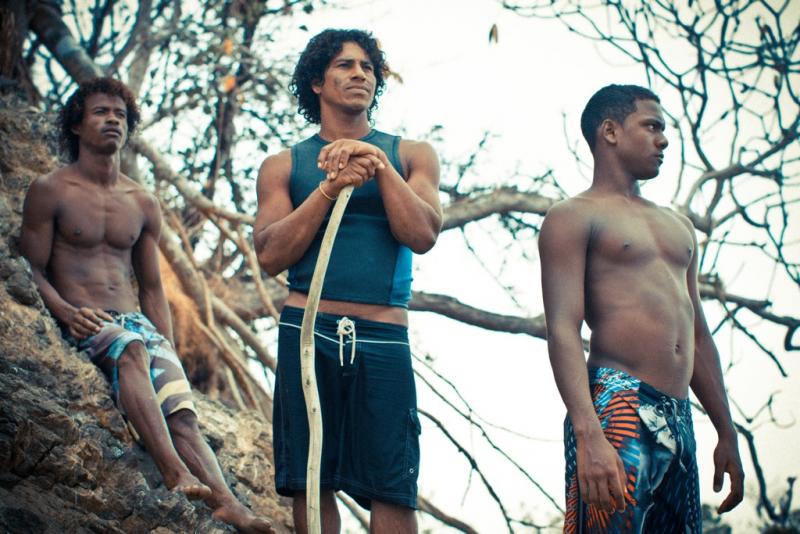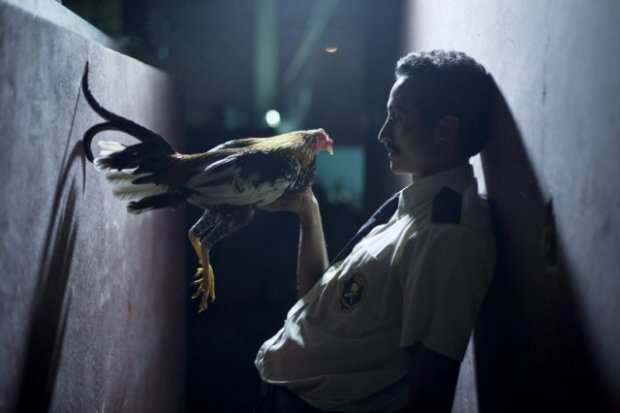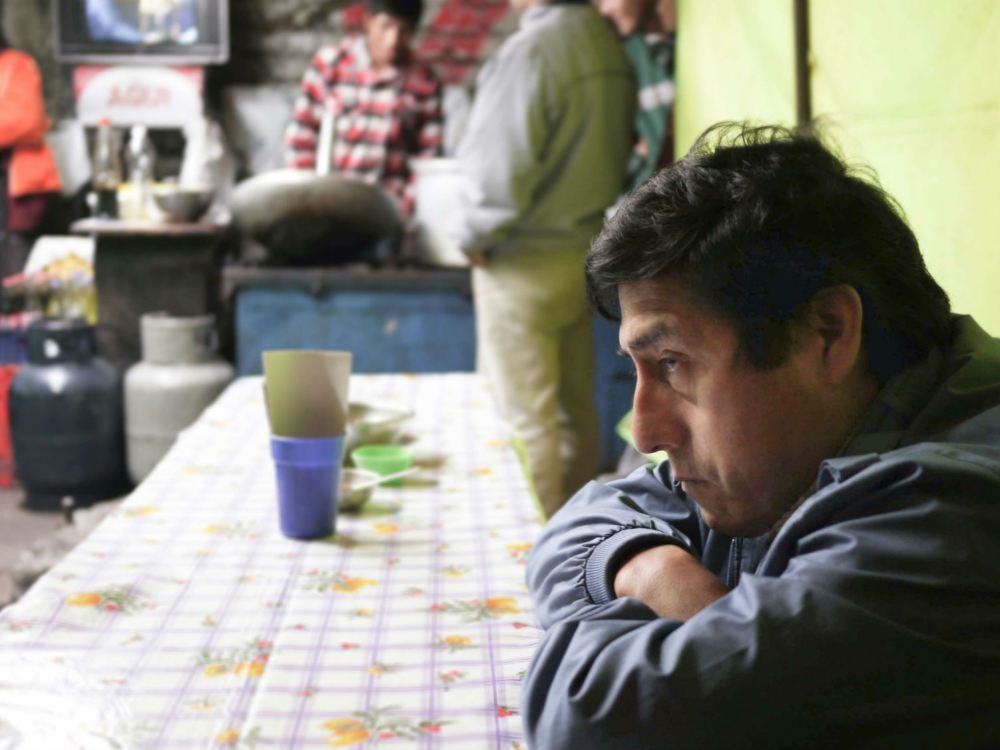theartsdesk in Panama: Hubris, suffering and cinema | reviews, news & interviews
theartsdesk in Panama: Hubris, suffering and cinema
theartsdesk in Panama: Hubris, suffering and cinema
The diversity of Latin American cinema was on show at an exciting young festival

The contradictions and iniquities of Panama City were very much in evidence last week.
Here was hubris and suffering, side by side in a city still struggling for its own identity years after the US supposedly loosened its grip on the country. Good timing for the third edition of the Panama International Film Festival, which attempted to reflect such contradictions, while giving its local audience a much-needed glimpse of the outside world, via films and a good deal of fun and provocation. The Arts Desk returned to Panama for a second year, to find this admirable, well-programmed festival continuing in fine form; even for those not force fed a diet of Hollywood product, it offered a neat snapshot of the latest Latin American cinema.
The invasion is not taught in schools, and there is no national day of remembrance First, from Panama itself, came two accomplished documentaries. Invasion (pictured below) was directed by Abner Benaim, a filmmaker whose sense of humour and bearish on-screen presence reminds one a little of Michael Moore, though without the American's grandstanding didacticism. Benaim’s film concerns the 1989 American invasion of the county, ostensibly to depose General Noriega, the “tropical Saddam”, though the US didn't ask Panamanians if they needed its assistance and no doubt the motive had more to do with the superpower’s own interests in the region – not to mention its embarrassment over the dictator who had worked for years with the CIA.
Interestingly, Benaim isn't concerned with the whys and wherefores of the invasion, but with ordinary Panamanians' recollections of the attack; in light of his compatriots' collective amnesia about the incident – the invasion is not taught in schools, and there is no national day of remembrance – the director is offering an oral history to spark debate.
 And so the film is essentially comprised of Panamanian citizens speaking to camera, at first in a studio, then on the streets of the city, recalling the bombs, helicopters and machine guns as the “gringos” invaded their city and killed thousands. Pathos is combined with great dashes of humour – there’s something of the upbeat Brazilian in the Panamanian psyche. And Benaim brings his own surreal contribution, eschewing archive for the sort of amateur recreations that also made the Oscar-nominated The Act of Killing so powerful.
And so the film is essentially comprised of Panamanian citizens speaking to camera, at first in a studio, then on the streets of the city, recalling the bombs, helicopters and machine guns as the “gringos” invaded their city and killed thousands. Pathos is combined with great dashes of humour – there’s something of the upbeat Brazilian in the Panamanian psyche. And Benaim brings his own surreal contribution, eschewing archive for the sort of amateur recreations that also made the Oscar-nominated The Act of Killing so powerful.
Panama's only prizes are audience awards, and Invasion deservedly won two of the three – best documentary, and best Central American and Caribbean film.
The other local documentary, Annie Canavaggio's Breaking the Wave, is a good-looking and engaging account of the struggle of Panama's black surfers to overcome the prejudice of their sport’s US-dominated sponsors, who can’t get enough of Panama’s beaches while loathe to support the local surfers, who don’t conform to their Beach Boy brand. Canavaggio focuses on a trio of these immensely likeable young men, who are skilled, stoic and determined in very different ways.
 A festival focus on Central America unearthed one particular pleasure. For the Feathers (pictured right) features the typical heroes of Latin American cinema, an underclass that gamely, amiably and haplessly strives for a better life – in this case, a security guard with ambitions in the cockfighting business.
A festival focus on Central America unearthed one particular pleasure. For the Feathers (pictured right) features the typical heroes of Latin American cinema, an underclass that gamely, amiably and haplessly strives for a better life – in this case, a security guard with ambitions in the cockfighting business.
This works on a different register to the customary Latin deadpan, playing instead as a chalk and cheese buddy movie, in which our laidback central character plays off against his manic, motormouth colleague, a former car thief turned born-again Christian. As security guards, all they seem to be guarding is a leaky-roofed, empty shed, giving them plenty of time to dream of glory and hang out with the neighbourhood Avon Lady. Their rooster, Rocky, is a scream.
 More serious fare included a couple of downbeat, bleakly compelling films. From Peru, The Mute is a black comedy concerning a low-level magistrate who is mysteriously shot in the neck. The incident leaves him mute and intent on investigating what he believes is a conspiracy against him. The fact that this chap is really quite loathsome - brought to chilling life, in a near silent performance by Fernando Bercilio (pictured above left) - leaves the film with a difficult but fascinating moral hole.
More serious fare included a couple of downbeat, bleakly compelling films. From Peru, The Mute is a black comedy concerning a low-level magistrate who is mysteriously shot in the neck. The incident leaves him mute and intent on investigating what he believes is a conspiracy against him. The fact that this chap is really quite loathsome - brought to chilling life, in a near silent performance by Fernando Bercilio (pictured above left) - leaves the film with a difficult but fascinating moral hole.
Based on a true story, the Chilean To Kill A Man charts the slowburn response of a forestry worker to the intolerable persecution of his family by a seedy drug addict. The film ably communicates first this ordinary, rather meek man’s humiliation, then his frustration as society singularly fails to come to his assistance. Reality adds a surprising sobriety to what might have been a gung-ho and fatuous revenge thriller.
 Overall, though, this year felt most notable for its upbeat films, whether the already greatly acclaimed Gloria, also from Chile, or newer fare such as the Mexican Paradise (pictured right), an unusual romantic comedy that charts a happy – and happily overweight – couple, comfortable in their own skins, until the woman succumbs to female peer pressure and urges her man to join her on a diet. When he succeeds, and she doesn’t, the romance drains away with the pounds.
Overall, though, this year felt most notable for its upbeat films, whether the already greatly acclaimed Gloria, also from Chile, or newer fare such as the Mexican Paradise (pictured right), an unusual romantic comedy that charts a happy – and happily overweight – couple, comfortable in their own skins, until the woman succumbs to female peer pressure and urges her man to join her on a diet. When he succeeds, and she doesn’t, the romance drains away with the pounds.
And the lightweight but immensely charming Argentine documentary Midsummer Night Tango follows a Buenos Aires tango trio as they travel to Finland to investigate the claim – drolly voiced by filmmaker Aki Kaurismäki – that it was the Finns who invented the tango, “to keep the wolves at bay.” It would have been tempting to read this odd little road movie as a spoof, were it not for some terrific music from Argentines and Finns alike, and the professional trio’s deepening respect for their unlikely equals.
Appropriately, the third audience award, for best Ibero-American fiction, was won by the Spanish romcom Three Many Weddings.
Explore topics
Share this article
The future of Arts Journalism
You can stop theartsdesk.com closing!
We urgently need financing to survive. Our fundraising drive has thus far raised £49,000 but we need to reach £100,000 or we will be forced to close. Please contribute here: https://gofund.me/c3f6033d
And if you can forward this information to anyone who might assist, we’d be grateful.

Subscribe to theartsdesk.com
Thank you for continuing to read our work on theartsdesk.com. For unlimited access to every article in its entirety, including our archive of more than 15,000 pieces, we're asking for £5 per month or £40 per year. We feel it's a very good deal, and hope you do too.
To take a subscription now simply click here.
And if you're looking for that extra gift for a friend or family member, why not treat them to a theartsdesk.com gift subscription?
more Film
 London Film Festival 2025 - a Korean masterclass in black comedy and a Camus classic effectively realised
New films from Park Chan-wook, Gianfranco Rosi, François Ozon, Ildikó Enyedi and more
London Film Festival 2025 - a Korean masterclass in black comedy and a Camus classic effectively realised
New films from Park Chan-wook, Gianfranco Rosi, François Ozon, Ildikó Enyedi and more
 After the Hunt review - muddled #MeToo provocation
Julia Roberts excels despite misfiring drama
After the Hunt review - muddled #MeToo provocation
Julia Roberts excels despite misfiring drama
 London Film Festival 2025 - Bradley Cooper channels John Bishop, the Boss goes to Nebraska, and a French pandemic
... not to mention Kristen Stewart's directing debut and a punchy prison drama
London Film Festival 2025 - Bradley Cooper channels John Bishop, the Boss goes to Nebraska, and a French pandemic
... not to mention Kristen Stewart's directing debut and a punchy prison drama
 Ballad of a Small Player review - Colin Farrell's all in as a gambler down on his luck
Conclave director Edward Berger swaps the Vatican for Asia's sin city
Ballad of a Small Player review - Colin Farrell's all in as a gambler down on his luck
Conclave director Edward Berger swaps the Vatican for Asia's sin city
 London Film Festival 2025 - from paranoia in Brazil and Iran, to light relief in New York and Tuscany
'Jay Kelly' disappoints, 'It Was Just an Accident' doesn't
London Film Festival 2025 - from paranoia in Brazil and Iran, to light relief in New York and Tuscany
'Jay Kelly' disappoints, 'It Was Just an Accident' doesn't
 Iron Ladies review - working-class heroines of the Miners' Strike
Documentary salutes the staunch women who fought Thatcher's pit closures
Iron Ladies review - working-class heroines of the Miners' Strike
Documentary salutes the staunch women who fought Thatcher's pit closures
 Blu-ray: The Man in the White Suit
Ealing Studios' prescient black comedy, as sharp as ever
Blu-ray: The Man in the White Suit
Ealing Studios' prescient black comedy, as sharp as ever
 The Woman in Cabin 10 review - Scandi noir meets Agatha Christie on a superyacht
Reason goes overboard on a seagoing mystery thriller
The Woman in Cabin 10 review - Scandi noir meets Agatha Christie on a superyacht
Reason goes overboard on a seagoing mystery thriller
 London Film Festival 2025 - crime, punishment, pop stars and shrinks
Daniel Craig investigates, Jodie Foster speaks French and Colin Farrell has a gambling habit
London Film Festival 2025 - crime, punishment, pop stars and shrinks
Daniel Craig investigates, Jodie Foster speaks French and Colin Farrell has a gambling habit
 I Swear review - taking stock of Tourette's
A sharp and moving tale of cuss-words and tics
I Swear review - taking stock of Tourette's
A sharp and moving tale of cuss-words and tics
 A House of Dynamite review - the final countdown
Kathryn Bigelow's cautionary tale sets the nuclear clock ticking again
A House of Dynamite review - the final countdown
Kathryn Bigelow's cautionary tale sets the nuclear clock ticking again

Add comment